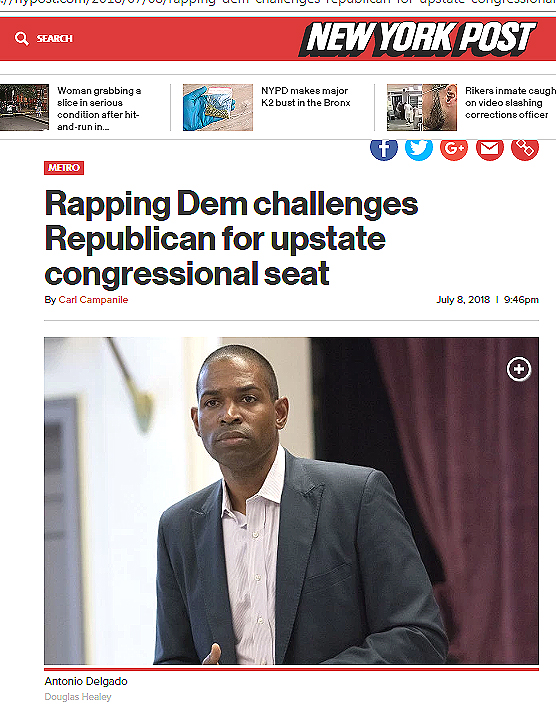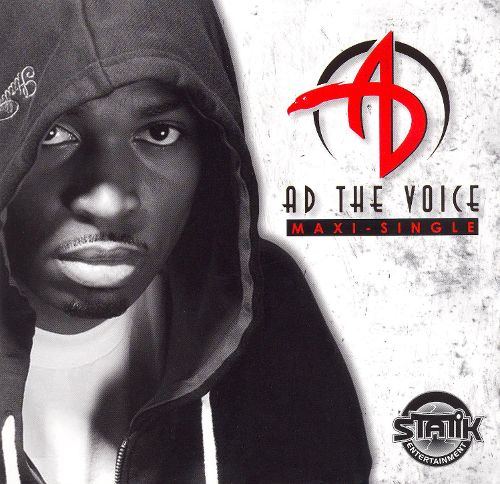Editorial, July 20, 2018
AD The Voice’s Rap
Career Emerges As
Campaign’s First Hot Potato
Get ready, folks. We’re going to be hearing a lot of hip-hop music between now and Nov. 6.
It was generally known during the just-completed primary campaign in our 19th Congressional District that the victor, Antonio Delgado, had been involved in a rap venture in Los Angeles more than a decade ago, but details were fuzzy. And they didn’t really matter: Chances were even or better that he wouldn’t win.
But June 26, he did win the nomination to challenge freshman congressman John Faso, R-Kinderhook, and it didn’t take long for the New York Post to get or, or be put on, the scent.
“He put out an 18-song CD titled ‘Painfully Free,’ in 2006,” the Post reported July 8, “in which he frequently hurls the N-word, slaps the two-party political system, rips the ‘dead’ president as ‘white supremacists,’ blasts capitalism, likens blacks to modern day slaves, calls poverty the ‘purest form of terrorism’” etc., etc.
Ouch.

Since, other outlets are picking up on the story, thanks to a press release from Faso saying, ““I was shocked” – shocked! – “and surprised to learn Mr. Delgado authored some very troubling and offensive song lyrics.”
On July 12, HV1.com, the website for five weeklies around Woodstock, had this: “Faso hammers Delgado on past hip-hop lyrics; Delgado says Faso’s ‘feeding into racial biases’.”
On July 14 in The Gazette, Schenectady: “Faso pivoted from carpetbagger attacks to arguing that the Schenectady native’s hip-hop lyrics ‘paint an ugly and false picture of America’.”
On July 13, the Times Herald-Record, Middletown, reported on a statement from 17 local clergy: “Shame on (Faso). This tactic should be called out for what it is: a thinly veiled racist attack for the purpose of insinuating fear in the voters of our district.”
And it’s accelerating. The fat’s on the fire.
•
There’s a cautionary tale here.
At the end of May, six of the seven Democrats running in the primary signed a pledge agreeing not to criticize each other.
Why, in a hard-fought campaign where candidates were having a problem differentiating themselves from everybody else in voters’ eyes, would this be desirable?
From a practical standpoint, if Delgado’s hip-hop muse had been dissected in the primary, perhaps he wouldn’t be the Democratic candidate; if he had been anyhow, the rap revelations would have been a shock to no one by now.
Yes, there are practical reasons to fully practice First Amendment Rights.
As you might expect, Delgado – a Colgate and Harvard grad, Rhodes Scholar and lawyer at a top (albeit politically connected) firm – had a smooth response to the Post.
“This is a willful and selective misreading of my work for political purposes,” he said. “My music defies the same stereotypical notions that led you … to immediately hear certain words and think they are bad or scary. If you listen to the content of the lyrics, my mission is clear.”

One review of “Painfully Free,” the 2006 CD, cited in the Post, said its “hardcore hip-hop/rap numbers tear into society hypocrisies and imperfections.” The album notes call the sound “fresh, sharp, political and spiritual” –
not so bad.
In any event, voters can decide for themselves. Go to Spotify, the music site, type in “AD the Voice,” Delgado’s stage name, and you can listen to it all.
•
Of course, rap itself has been controversial since it came onto the general music scene a three decades ago.
In 2012, theologian Emmett Price III sought to understand the music as part of black tradition. A reviewer of his book of essays, “The Black Church and Hip Hop Culture,” that found both the church and rap were “impassioned with the same urgent desires for survival and hope.”
Nothing the matter with that. Still, the actual lyrics in AD the Voice’s numbers will no doubt be jarring to many in the 19th. And, if the lyrics are being misinterpreted, it will be Delgado’s challenge to put them in context. He very well might.
If you haven’t met him, you will find him open, engaging, approachable; hardly threatening – “a young Barack Obama,” he was called in this newspaper a year ago after his first appearance in Oneonta. He has many strengths to bring to bear.
For Faso, this issue may seem like pure gold, and it may be. (The first radio ad, by the Congressional Leadership Fund, cited Delgado’s views as “explosive,
out of touch, liberal.”)
•
But given Delgado’s TV ad in a last days of the primary – a cancer victim wins Faso’s assurances he will protect her insurance, only to vote to water down the Affordable Care Act; Google “antonio delgado promise ad” – he would be wise not to be complacent, which no doubt he isn’t.

